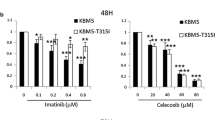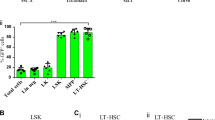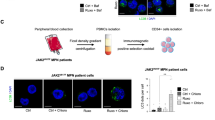Abstract
Autophagy is an evolutionarily conserved cellular process in which components of the cytoplasm are delivered to lysosomes for degradation and has been proposed to play a role in imatinib resistance in chronic myeloid leukemia cells. Chronic myeloid leukemia is a clonal myeloproliferative disorder arising from the neoplastic transformation of the hematopoietic stem cell. We used a Bcr-Abl-independent and imatinib-resistant K562 subpopulation (K562-IR) that we generated earlier in our laboratory for this study. We showed that in the presence of imatinib autophagy was triggered via LC3I/II transformation, p62 protein expression and acidic vacuoles accumulation in tyrosine kinase inhibitor-sensitive K562 cells; whereas in the cell line K562-IR which is imatinib-resistant and Bcr-Abl independent, autophagy is not triggered. With ongoing research and trails to combine tyrosine kinase inhibitors with autophagy inhibitors, our results suggest a model of resistance in which treatment with a TKI inhibitor does not increase autophagy, basically because its presence does not cause cellular stress due to Bcr-Abl signaling not being required for survival.


Similar content being viewed by others
REFERENCES
Quintás-Cardama A., Cortes J. 2009. Molecular biology of bcr-abl1-positive chronic myeloid leukemia. Blood. 113, 1619–1630.
Deininger M.W.N., Goldman J.M., Melo J.V. 2000. The molecular biology of chronic myeloid leukemia. Blood. 96, 3343–3356.
Hochhaus A., Larson R.A., Guilhot F., Radich J.P., Branford S., Hughes T.P., Baccarani M., Deininger M.W., Cervantes F., Fujihara S., Ortmann C.-E., Menssen H.D., Kantarjian H., O’Brien S.G., Druker B.J. 2017. Long-term outcomes of imatinib treatment for chronic myeloid leukemia. N. Engl. J. Med. 376, 917–927.
D’Arcy M.S. 2019. Cell death: a review of the major forms of apoptosis, necrosis and autophagy. Cell. Biol. Int. 43, 582–592.
Denton D., Kumar S. 2019. Autophagy-dependent cell death. Cell Death Differ. 26, 605–616.
Levine B., Kroemer G. 2008. Autophagy in the pathogenesis of disease. Cell. 132, 27–42.
Yu L., Chen Y., Tooze S.A. 2018. Autophagy pathway: Cellular and molecular mechanisms. Autophagy. 14, 207–215.
Geng J., Klionsky D.J. 2008. The Atg8 and Atg12 ubiquitin-like conjugation systems in macroautophagy. EMBO Rep. 9, 859–864.
Bialik S., Dasari S.K., Kimchi A. 2018. Autophagy-dependent cell death: Where, how and why a cell eats itself to death. J. Cell Sci. 131, jcs215152.
Shidoji Y. 2014. Geranylgeranoic acid induces incomplete autophagy but leads to the accumulation of autophagosomes in human hepatoma cells. In: Autophagy: Cancer, Other Pathologies, Inflammation, Immunity, Infection, and Aging. Elsevier, vol. 3, pp. 173–185.
Kroemer G., Levine B. 2008. Autophagic cell death: The story of a misnomer. Nat. Rev. Mol. Cell. Biol. 9 (12), 1–17.
Crowley L.C., O’Donovan T.R., Nyhan M.J., McKenna S.L. 2013. Pharmacological agents with inherent anti-autophagic activity improve the cytotoxicity of imatinib. Oncol. Rep. 29, 2261–2268.
Shao S., Li S., Qin Y., Wang X., Yang Y., Bai H., Zhou L., Zhao C., Wang C. 2014. Spautin-1, a novel autophagy inhibitor, enhances imatinib-induced apoptosis in chronic myeloid leukemia. Int. J. Oncol. 44, 1661–1668.
Mishima Y., Terui Y., Mishima Y., Taniyama A., Kuniyoshi R., Takizawa T., Kimura S., Ozawa K., Hatake K. 2008. Autophagy and autophagic cell death are next targets for elimination of the resistance to tyrosine kinase inhibitors. Cancer Sci. 99, 2200–2208.
Deininger M.W.N., Druker B.J. 2003. Specific targeted therapy of chronic myelogenous leukemia with imatinib. Pharmacol. Rev. 55, 401–423.
Baykal-Köse S., Acikgoz E., Yavuz A.S., Geyik Ö.G., Ateş H., Sezerman O.U., Özsan G.H., Yüce Z. 2020. Adaptive phenotypic modulations lead to therapy resistance in chronic myeloid leukemia cells. PLoS One. 15 (2), e0229104. https://doi.org/10.1371/journal.pone.0229104
Mauthe M., Orhon I., Rocchi C., Zhou X., Luhr M., Hijlkema K.J., Coppes R.P., Engedal N., Mari M., Reggiori F. 2018. Chloroquine inhibits autophagic flux by decreasing autophagosome-lysosome fusion. Autophagy. 14, 1435–1455.
Barth S., Glick D., Macleod K.F. 2010. Autophagy: Assays and artifacts. J. Pathol. 221, 117–124.
O’Hare T., Zabriskie M.S., Eiring A.M., Deininger M.W. 2012. Pushing the limits of targeted therapy in chronic myeloid leukaemia. Nat. Rev. Cancer. 12, 513–526.
Bubnoff N., Duyster J. 2010. Chronic myelogenous leukemia: Treatment and monitoring. Dtsch. Arztebl. Int. 107, 114–121.
Chen Y., Li S. 2013. Molecular signatures of chronic myeloid leukemia stem cells. Biomark. Res. 1, 21.
Zhang H., Li S. 2013. Molecular mechanisms for survival regulation of chronic myeloid leukemia stem cells. Protein Cell. 4, 186–196.
Hu Y., Li S. 2016. Survival regulation of leukemia stem cells. Cell Mol. Life Sci. 73, 1039–1050.
Calabretta B., Salomoni P. 2011. Inhibition of autophagy: A new strategy to enhance sensitivity of chronic myeloid leukemia stem cells to tyrosine kinase inhibitors. Leuk. Lymphoma. 52, 54–59.
Shen S., Codogno P. 2016. The role of autophagy in cell death. In: Autophagy: Cancer, Other Pathologies, Inflammation, Immunity, Infection, and Aging. Elsevier, pp. 139–154.
Auberger P., Puissant A. 2017. Autophagy, a key mechanism of oncogenesis and resistance in leukemia. Blood. 129, 547–552.
Chen N., Karantza V. 2011. Autophagy as a therapeutic target in cancer. Cancer Biol. Ther. 11, 157–168.
Ricci M.S., Zong W. 2006. Chemotherapeutic approaches for targeting cell death pathways. Oncologist. 11, 342–357.
Ertmer A., Huber V., Gilch S., Yoshimori T., Erfle V., Duyster J., Elsässer H.P., Schäzl H.M. 2007. The anticancer drug imatinib induces cellular autophagy. Leukemia. 21, 936–942.
Yu C., Gorantla S.P., Müller-Rudorf A., Müller T.A., Kreutmair S., Albers C., Jakob L., Lippert L.J., Yue Z., Engelhardt M., Follo M., Zeiser R., Huber T.B., Duyster J., Illert A.L. 2020. Phosphorylation of BECLIN-1 by BCR-ABL suppresses autophagy in chronic myeloid leukemia. Haematologica. 105, 1285–1293.
Kharas M.G., Janes M.R., Scarfone V.M., Lilly M.B., Knight Z.A., Shokat K.M., Fruman D.A. 2008. Ablation of PI3K blocks BCR-ABL leukemogenesis in mice, and a dual PI3K/mTOR inhibitor prevents expansion of human BCR-ABL+ leukemia cells. J. Clin. Invest. 118, 3038–3050.
Klejman A., Rushen L., Morrione A., Slupianek A., Skorski T. 2002. Phosphatidylinositol-3 kinase inhibitors enhance the anti-leukemia effect of STI571. Oncogene. 21, 5868–5876.
Mohi M.G., Boulton C., Gu T.L., Sternberg D.W., Neuberg D., Griffin J.D., Gilliland D.G., Neel B.G. 2004. Combination of rapamycin and protein tyrosine kinase (PTK) inhibitors for the treatment of leukemias caused by oncogenic PTKs. Proc. Natl. Acad. Sci. U. S. A. 101, 3130–3135
Baquero P., Dawson A., Mukhopadhyay A., Kuntz E.M., Mitchell R., Olivares O., Ianniciello A., Scott M.T., Dunn K., Nicastri M.C., Winkler J.D., Michie A.M., Ryan K.M., Halsey C., Gottlieb E., et al. 2019. Targeting quiescent leukemic stem cells using second generation autophagy inhibitors. Leukemia. 33, 981–994.
Yu Y., Yang L., Zhao M., Zhu S., Kang R., Vernon P., Tang D., Cao L. 2012. Targeting microRNA-30a-mediated autophagy enhances imatinib activity against human chronic myeloid leukemia cells. Leukemia. 26, 1752–1760.
Bellodi C., Lidonnici M.R., Hamilton A., Helgason G.V., Soliera A.R., Ronchetti M., Galavotti S., Young K.W., Selmi T., Yacobi R., Van Etten R.A., Donato N., Hunter A., Dinsdale D., Tirrò E., et al. 2009. Targeting autophagy potentiates tyrosine kinase inhibitor-induced cell death in Philadelphia chromosome-positive cells, including primary CML stem cells. J. Clin. Invest. 119, 1109–1123.
Jung C.H., Ro S.H., Cao J., Otto N.M., Kim Do-Hyung D.H. 2010. MTOR regulation of autophagy. FEBS Lett. 584, 1287–1295.
Funding
This work is financed by Dokuz Eylul University Scientific Research Foundation grant number: 2009KBSAG29.
Author information
Authors and Affiliations
Contributions
Zeynep Yüce and Seda Baykal-Köse contributed to the study conception and design. Material preparation, data collection, and analysis were performed by Seda Baykal-Köse and Hande Efe. The first draft of the manuscript was written by Seda Baykal-Köse and Zeynep Yüce. All authors read and approved the final manuscript.
Corresponding author
Ethics declarations
COMPLIANCE WITH ETHICAL STANDARDS
The authors declare that they have no conflict of interest. This article does not contain any research involving humans or animals as subjects of research.
ADDITIONAL INFORMATION
The text was submitted by the author(s) in English.
Rights and permissions
About this article
Cite this article
Baykal-Köse, S., Efe, H. & Yüce, Z. Autophagy Does Not Contribute to TKI Response in a Imatinib-Resistant Chronic Myeloid Leukemia Cell Line. Mol Biol 55, 573–579 (2021). https://doi.org/10.1134/S0026893321030043
Received:
Revised:
Accepted:
Published:
Issue Date:
DOI: https://doi.org/10.1134/S0026893321030043




